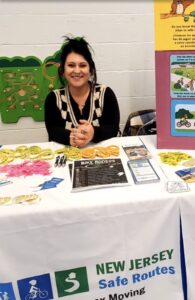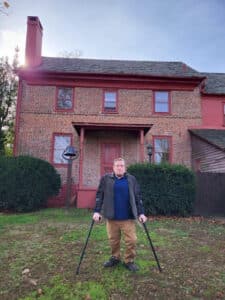by Cyndi Steiner
In 2014, 30% of all road fatalities in New Jersey occurred to pedestrians (a 25% increase over 2013), likely putting the state at the top of the list for the nation in road fatalities; NJ has been the second worse state up until 2014, based on data from the National Highway Traffic Safety Administration (NHTSA).
NJ has been named by the Federal Highway Administration (FHWA) as a pedestrian focus state, and received the highest increase in federal HSIP (Highway Safety Improvement Program) funding in 2013 of any state (160%), due to this alarming situation.
Yet the state still has no safe passing law, thanks to one lawmaker who seems uninterested in understanding the larger picture of pedestrian and bicycle injuries and fatalities, and rules of the road. Senator Nicholas Sacco (D-32), who is also the mayor of North Bergen, chairs the Senate Transportation Committee, and refuses to even allow the committee to discuss the proposed bill despite tremendous support throughout the state for such protection.
Here is a brief history of the safe passing bill in New Jersey:
April 2009 – three-foot safe passing bill for bike riders (S2737) does not get voted upon by the Senate Transportation Committee due to two objections raised by Senator Nicholas Sacco, the committee chair:
- The senator wanted the state Attorney General’s endorsement
- The senator wanted NJDOT’s endorsement.
January 2014
- Asw. Grace Spencer (D-29) introduces A1600, the ”Move Over” bill, which requires motorists to either move over or slow down when passing a bicyclist or pedestrian.
- The Move Over bill closely follows the Move Over law for police and emergency personnel.
- Pedestrian is a broad category that includes, but is not limited to, runners, crossing guards, construction workers, skaters, skateboarders, and wheelchair users.
January – March 2014
- NJBWC and Tri-State Transportation Campaign (TSTC) obtain support from the NJDOT for the bill.
- TSTC obtains unofficial opinion from the state Attorney General’s office supporting the bill.
May 1, 2014
- League of American Bicyclists releases their Bicycle Friendly State ranking. New Jersey slips five places, to number 12.
- The lack of a safe passing bill and a vulnerable road user bill are named by the League as the top two reasons for the drop in rankings.
May 15, 2014
- NJBWC’s Education Coordinator Les Leathem testifies in support of A1600/A1577, a combined bill that encompasses the “Move Over” provision and a four-foot/safe passing provision.
- A1600/A1577 covers all vulnerable road users- bicyclists and pedestrians.
- The Assembly Transportation and Independent Authorities Committee passes the combined bill.
June 14, 2014
- A1600/A1577 passes the state Assembly, along party lines (50-21-6).
- The bill gets referred to the Senate Transportation Committee.
June – October 2014
- NJBWC and TSTC obtain the support for the bill from AAA, AARP, Bicycle Coalition of Greater Philadelphia, and the Police Traffic Officers Association.
- Senator Brian Stack (D-33), member of the Senate Transportation Committee, agrees to co-sponsor the bill in the Senate after meeting with NJBWC and TSTC.
- NJBWC, TSTC, and AAA create a markup version of the bill that includes a speed component as well as a move over and safe distance component.
October 2014
- NJBWC sends the markup version to Senator Nicholas Sacco and requests a meeting.
- Senator Sacco’s office arranges a call with NJBWC and notifies the organization that the bill will not be posted.
During that conversation, Sen. Sacco’s office maintained that the bill would not be posted by the committee, as there were many constituents in the senator’s district that were opposed to bicyclists on the road, and that they wanted any existing bicycle lanes removed. The senator’s office refused to acknowledge that this bill covers all vulnerable road users, not just bicyclists, and remained focused solely on perceived issues with bike riders.
The senator’s office also maintained that there is existing law that covers vehicles moving around slower moving vehicles and pedestrians in the roadway, although his aide could not name any specific law; NJBWC verified with the Essex County College Police Academy, and the Police Traffic Officers Association that this is not, in fact, the case. The Police Traffic Officers Association would not be supportive of the bill if that were true.
The senator’s office requested that the bill provide an “opt-in” by municipality. NJBWC is not supportive of any type of opt-in or opt-out, for several reasons:
- An “opt-in” will cause confusion to motorists as they drive from town to town in the state.
- The Police Traffic Officers Association is not supportive of an opt-in or opt-out provision.
- This sets a bad precedent for all future bills the legislature considers.
- No other state that has a safe passing law has an opt-in or opt-out condition.
As of May 2015, thirty-two states and DC have a 3 foot safe passing distance law, and Pennsylvania has a four foot safe passing distance; New Jersey is the only state in the Northeast with no safe passing law.
The senator’s latest reason for not allowing the bill to be introduced in committee is that the streets in his district are too narrow and that drivers would be forced into oncoming traffic. This kind of response assumes that drivers do not have the ability to make safe judgments for themselves while driving, and that cars will be plowing head-on into each other at will, with no control over the circumstances.
Nevertheless, NJBWC, TSTC and AAA included this condition in the marked up version (which was provided to Sen. Sacco), which provides for a complete lane change, and when that is not possible, a four foot passing distance, and when that is not possible, slowing down until it is safe to move over. This version accommodates the various and myriad traffic environments (urban, suburban, rural; shoulder/no shoulder) within the state, leaving the senator with no arguments against this bill.
Sen. Sacco seems to believe that his jurisdiction is somehow a unique special case, in which protecting vulnerable road users is impossible; this is a tired old game that kills people. Other states have cities and dense suburbs too, but they’ve stepped up and passed safe-passing laws. New Jersey needs to do the same.
Having safe roads for pedestrians and bicyclists should be everyone’s priority. We feel that this bill is a start in making our roads safer.
See our Comcast Newscast interview here regarding the safe passing bill.
Cyndi Steiner is the Executive Director of the New Jersey Bike & Walk Coalition






























































































